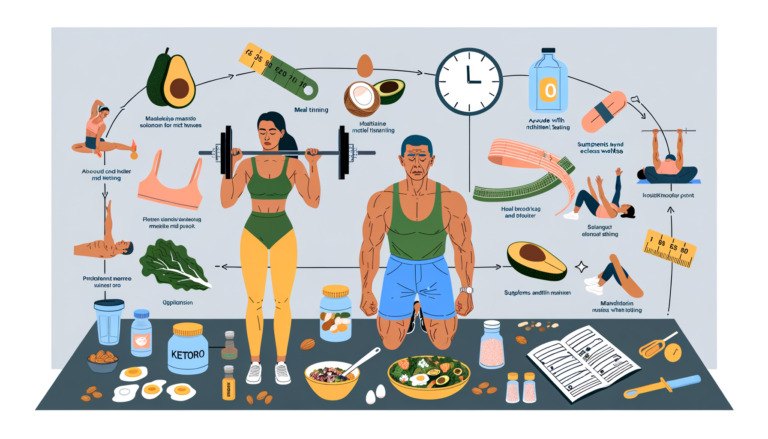The ketogenic diet is surrounded by myths and misconceptions, especially when it comes to those over 40. “Keto Diet Myths Busted: What People Over 40 Need to Know” aims to clear up the confusion and set the record straight. In this article, we’ll debunk the most common keto myths and reveal the truth about how this diet can benefit you as you age. From concerns about heart health to the fear of losing muscle, we’ll tackle it all. Ready to separate fact from fiction and unlock the real benefits of keto after 40? Keep reading to discover what you really need to know.
Understanding the Basics of a Ketogenic Regime
When you kick off with the ketogenic diet, it’s like walking on a new path. This eating plan is low in carbohydrates and high in healthy fats, flipping the script on the Standard American Diet’s high-carb, low-fat template. It involves drastically reducing carb intake while bumping up fat, triggering your body to enter a metabolic state known as ketosis. In this state, the body becomes incredibly efficient at burning fat for energy. Don’t step back fearing the word ‘fat’. Not all fats are villains in your weight-loss journey.
The macronutrient breakdown of a typical ketogenic diet looks like this: 70-75% fat, 20-25% protein, and 5-10% carbs. This shift can feel drastic if you’re used to gorging on bread, pasta, and sugary treats, but the body is surprisingly adaptable. After an initial adjustment period, many people report increased energy levels, sharper mental focus, and of course, weight loss. But, it’s not only about weight-watching; the Keto diet offers potential benefits for a wide range of health conditions like epilepsy, diabetes, and even some forms of cancer. That’s food for thought, isn’t it?
The Age Factor: Why This is Important Post-40
Turning the big 4-0 shouldn’t be feared, but it does come with inherent changes, one of them being metabolism. As we age, our metabolic rate naturally slows down. This means you burn fewer calories doing the same activities you used to; even at rest, your body isn’t torching through calories like it did in your early 20s. This metabolic downshift coupled with muscle loss that often accompanies aging can lead to gradual weight gain and increased difficulty in losing weight. A ketogenic diet, high in fats and low in carbs, can potentially counter this by prompting your body to burn fat for energy.
Meanwhile, hormonal changes that come with age, particularly for women hitting menopause, can further complicate the weight loss journey. Fluctuating estrogen levels affect where the body stores fat, often shifting from the hips and thighs to the abdominal region. Increased abdominal fat is linked with a higher risk of heart disease and type 2 diabetes. Transitioning to a ketogenic diet may aid in managing weight gain and targeting stubborn abdominal fat. Plus, it’s never too late to adopt healthier habits. Age should be a motivator, not an obstacle, in the pursuit of health and well-being.
Unveiling Common Misconceptions About the Ketogenic Lifestyle
There’s quite some buzz around the ketogenic diet and like with any popular health trend, misunderstandings are rife. With ideas floating around like keto being a high-protein diet to the fear of the infamous “keto flu”, it’s high time we laid down some hard facts and debunked these misconceptions that often keep people from exploring this potential lifestyle change.
The ketogenic diet, called keto for short, is essentially a low-carb, high-fat dietary plan. Noticeably absent in the description is ‘high-protein’. This common misconception might be due to its similarity with other low-carb diets like Atkins which do focus on higher protein intake. But the truth is, keto is about moderation in protein, emphasizing fats to coax your body into a metabolic state called ketosis. Meanwhile, the dreaded “keto flu” is another misconception cited at the mention of going keto. It’s not a permanent state. Yes, it’s real and can feel nasty, but it’s essentially the body adjusting to the new fuel source. Just stick through the initial phase and you’ll come out on the other side, most likely feeling better than before.
Exploring the Truth Behind the ‘Keto Flu’
So you’ve heard about the infamous ‘Keto Flu,’ right? Well, let’s just dive right in and demystify it. The term keto flu is used to describe the flu-like symptoms that some people experience when they first reduce their carbohydrate intake. They may feel tired, have a headache, become irritable, or even have nausea. This is a normal reaction as your body adapts to a dramatic decrease in carbohydrate consumption.
While the symptoms are comparable to the flu, it’s not a virus, but a sign that your body is switching from burning glucose for energy to burning fat. This upheaval can trigger various responses, such as these flu-like symptoms. Don’t worry though, this should only last a few days to a week as your body adjusts to the new way of eating and burning fuel. It’s crucial to stay hydrated and replenish electrolytes during this period. Rest assured, once your body adjusts, you’ll be on your way to a healthier lifestyle. Let’s break down the symptoms and ways to manage them:
• Feeling Tired: This is a common symptom when your body starts burning fat for energy instead of glucose. You might feel sluggish or have less energy than usual. Don’t worry, this should pass within a few days.
◦ Solution: Make sure you’re getting enough sleep and try a light exercise like walking or yoga.
• Headaches: These can be caused by dehydration as your body adjusts to the new diet.
◦ Solution: Drink plenty of water! Staying hydrated is key during this transition period.
• Irritability: This could be due to low blood sugar levels as you cut out carbs from your diet.
◦ Solution: Eat small amounts regularly throughout the day, focusing on high-protein foods that will keep you feeling fuller longer.
• Nausea: Some people may experience nausea in response to their changing diet.
◦ Solution: Try eating smaller meals more frequently rather than three large meals per day. Ginger tea can also help soothe an upset stomach.
Remember that while these symptoms are uncomfortable, they are temporary and should subside once your body has adjusted to its new fuel source – fats instead of carbohydrates. As always though, if these symptoms persist or become severe, it’s important to seek medical advice immediately.
Here are some additional tips for managing keto flu:
• Stay Hydrated: Since many keto flu symptoms stem from dehydration, make sure you’re drinking plenty of fluids throughout the day.
• Replenish Electrolytes: Consuming food rich in electrolytes such as spinach, avocados, etc., can help minimize keto flu symptoms
• Moderate Exercise: Light physical activity such as walking or yoga can also help alleviate some discomfort associated with transitioning into ketosis
So there you have it – everything about ‘Keto Flu’. Remember that every person’s journey into ketosis is unique, and not everyone will experience these symptoms. So don’t be discouraged if you do – it’s just a sign that your body is adapting to its new fuel source!
The Misconception of Endless Protein Intake
Any conversation about the ketogenic diet invariably spins around a common myth: the bigger the protein intake, the better the results. Some sort of protein free-for-all, where one shovels iota after iota of the nutrient into their mouth, in anticipation of reaching that coveted state of ketosis. However, this perception represents a superficial understanding of the ketogenic diet, and more importantly, a blatant misunderstanding of how our bodies interact with protein.
Protein, in essence, is a vital nutrient, but endless consumption doesn’t necessarily speed up your journey into ketosis. A ketogenic diet demands a delicate equilibrium, where limited carbs and abundant healthy fats take precedence, while protein is moderated. As protein can be converted into glucose, overconsumption might inadvertently push your lucky ketosis ticket away on the metabolic train. So, remember: protein is essential, but the ‘more the merrier’ rule doesn’t apply here.
Busting the Myth: Fat Makes You Fat
Many folks falter when they hear the word “fat.” It immediately triggers the thought that consuming fat will lead to an undesirable gain in weight. But, hey, let me put things straight for you; not all fats spell trouble! In fact, a ketogenic diet, which is high in fat content, might just be the secret to your weight loss journey. It’s vital to differentiate between healthy fats and unhealthy fats. You’ll be amazed at how your body transforms when you feed it right!
Now, let’s dive into some science. Consuming a lot of carbs causes your body to produce glucose and insulin. Your body will naturally choose these as energy sources, letting other nutrients like fats to be stored. In contrast, lowering your carb intake and ramping up the fats propels your body into a metabolic state known as ketosis. During ketosis, your body efficiently burns fat for energy instead of carbs. So you see, fats don’t necessarily make you fat. It’s all about what kind of fats you’re consuming and balancing it with your overall dietary intake. Chaos and confusion will arise only when there’s an imbalance in the fuel you feed your body.
Does Ketosis Lead to Dangerous Heart Conditions?
There’s a common misconception people have, thinking life in a state of ketosis might flip the switch on dangerous heart conditions. This worry stems primarily from the misconception that a high intake of fats translates to blocked arteries and cardiovascular disease. But in reality, a well-maintained ketogenic diet as prescribed by a health expert is quite the contrary. Not only are the fats eaten on a ketogenic diet healthy but a shift to burning fat for fuel, dubbed as ketosis, actually has beneficial effects on heart health.
It’s all about the quality of fats integrated into your diet. A well-planned ketogenic diet is rich in heart-healthy monounsaturated and polyunsaturated fats which are known for their positive impact on heart health. Healthy fats, contrary to popular belief, can help lower bad cholesterol levels and increase the good ones while providing other heart-beneficial effects such as reducing inflammation. Therefore, it’s crucial to understand that ketosis, achieved through a balanced and professionally regulated keto diet, is not synonymous with heart damage.
The ‘One Size Fits All’ Fallacy: Individualising Your Diet
Keto isn’t a one-size-fits-all solution, no more than any other diet. Like all dietary routines, it needs to be adjusted to fit in with your lifestyle, goals, health status, and even your personal taste. Its flexibility is one of its major strengths, and that’s something often overlooked by those new to the concept. No need to be rigid about the number of carbs or protein, as it’s about striking the right balance that suits your body.
Falling into the trap of the ‘one-size-fits-all’ approach isn’t unusual, given the abundance of generic keto advice available on the internet. However, bear in mind, that these are just guides and not set-in-stone rules. Everybody is unique, which clearly means the same dietary regime won’t offer the same results for everyone. Feel free to play around with your food options, monitor your progress closely, and make the necessary tweaks to make your ketogenic diet a truly personalized experience.
Exposing the Myth: Carbs Are Essential
One of the most widespread dietary misconceptions out there is the notion that carbohydrates are an essential part of our diet. This belief has been indoctrinated into us by decades of health and nutritional advice. Carbohydrates are not the enemy, per se, but it’s crucial to understand they are not as crucial as we’ve been led to believe.
Sure, they’re a readily available source of energy, but they’re hardly the only one. Our bodies are remarkably efficient machines, adaptable to various energy forms. When carbohydrates are scarce, like in a ketogenic diet, the body switches gears and begins using fats for fuel. So, getting rid of carbs doesn’t mean you’re depriving your body, it just means you’re changing the kind of fuel it uses. The beauty of our metabolism is its flexibility.
The False Claim: Keto Causes Nutrient Deficiency
Some folks have a perception that the Ketogenic diet leads to nutrient deficiency. They express concern that cutting out entire food groups, like grains, from the diet depletes the body of essential nutrients. However, the reality is that different foods can provide the same nutrients, such as vitamins and minerals. For instance, while whole grains are a rich source of fiber, you can also get substantial amounts of fiber from veggies, nuts, and seeds.
Moreover, a well-planned ketogenic diet includes a diverse range of food groups, each contributing to meeting the nutrient requirements. Foods like meat, fish, eggs, and dairy products which form a significant part of the keto diet, offer an ample supply of essential vitamins and minerals. From Vitamin B12 to iron, these food groups have you covered. Additionally, adding leafy greens ensures a good dose of antioxidants and Vitamin C. So, the idea of nutritional deficiency on a keto diet is merely a product of misunderstanding and misinformation.
Reality Check: Does Keto Imply Starving Yourself?
There’s a popular notion floating around that going keto means starving yourself. Let’s set the record straight: that’s a massive myth. Keto is all about swapping your macronutrients – it’s low in carbs, moderate in proteins, and high in fats. This dietary shift is not synonymous with starvation because you’re still getting a ton of nutrients from high-quality, satiating foods like avocado, eggs, and lean meats. It’s a different way of fueling your body, but it definitely doesn’t mean going hungry.
Many people following a keto diet report feeling more satiated than they did on higher-carb diets. This is due to the nutrient-dense food consumed on keto and the way your body metabolizes fat as its main energy source. It could also be the effect of ketones, the byproducts your body produces when it burns fat; research suggests ketones may suppress appetite. You’re not starving yourself; instead, you’re just feeding your body more efficiently and effectively. So, the keto diet doesn’t mean less food; it just means different food.
The Truth About the Speed of Weight Loss on Keto
Diving headfirst into the world of keto, you’ve likely heard fairy tales about lightning-fast weight loss. The reality, however, isn’t quite the same. Sure, many people experience a fast drop in weight when they first start a ketogenic diet, but what’s happening here is often misrepresented. You see, in the initial phase, most of the weight lost is due to water loss. The body is depleting its stores of glycogen, which holds onto water, so when that’s all used up, it results in significant, rapid weight loss.
Now here’s the catch – as your body adjusts to being in ketosis, the pace of weight loss usually slows down, which is entirely normal and, in fact, healthier. The ketogenic diet can indeed assist in weight loss over time as it helps to promote satiety, reduce hunger, and facilitate the burning of stored fat for energy. However, the rate of weight loss varies from person to person and is highly influenced by factors like calorie intake, activity level, and personal metabolism. So, don’t fall for the myth of speedy weight loss on keto – sustainable progress takes time.
The Unrealistic Expectancy of Consistent Weight Loss
Let’s all take a step back and get real on the weight loss scene. Some folks decide to jump on the keto express with the idea of shedding pounds effortlessly like they’re suspects in a police chase. The fact is, it’s a tall tale that pursuing a ketogenic regimen will lead to unwavering, consistent weight loss.
>>> Check this post about Keto Plateau After 40
Everyone’s body responds differently to dietary changes, adding to the variables that influence weight loss rates. Expecting a never-ending drop in weight every week can leave you feeling frustrated and maybe even lead you to abandon the diet entirely. Remember, it’s all about the journey, not just the destination! Beyond the scale victories, the ketogenic lifestyle also spells improvements in metabolic health, energy levels, mental clarity, and overall well-being.
Decoding the Misunderstanding: Keto and Athletic Performance
One of the most intriguing misunderstandings about the ketogenic diet revolves around athletic performance. Many fitness enthusiasts operate under the assumption that without a heavy carbohydrate intake, one’s performance in sports or workouts might suffer. This perception is partially fueled by the traditional emphasis on carbohydrates as the chief source of energy. However, an increasing amount of research indicates that a shift to fat-based energy might just offer equivalent, if not superior performance in some athletes.
Switching to a keto diet essentially transforms your body into a fat-burning machine. When you run on carbs, they burn quickly, often leaving you in need of a top-up midway through a workout. But fats? They burn slower, which can sustain a workout for significantly longer periods. This shift towards fat-based metabolism changes our fuel preference, favoring fats over carbs for energy, implying that athletes on keto can better utilize their fat stores for energy. While this doesn’t mean you’ll turn into an overnight sensation on your sports team, it opens up a fascinating new channel for exploring performance optimization.
Clearing the Air: Is Keto Sustainable in the Long Run?
Is the ketogenic diet sustainable in the long run? This debate has certainly been making rounds in both health and fitness circles. One group views it as a way of life, citing increased energy levels, weight management, improved focus, and better physical performance. On the other side, there’s a faction that views the strict low-carb, high-fat lifestyle as unsustainable, arguing maintaining such a diet is challenging in today’s carbohydrate-heavy food environment.
Some have found a solution: cycling in and out of ketosis. This more flexible approach appears to be gaining ground among those looking for a middle path. Yet, sustainability ultimately hinges on an individual’s lifestyle, food preferences, and commitment to their health goals. Most importantly, feeling good and seeing results certainly helps etch a dietary practice into everyday life. As with any diet, however, medical supervision is key in circumventing potential health risks.
FAQ: What People Over 40 Need to Know
What is the basis of a ketogenic diet?
A ketogenic diet focuses on high fat, moderate protein, and very low carbohydrate intake, which forces the body to burn fats rather than carbohydrates, thereby putting the body in a metabolic state known as “ketosis”.
I’m over 40, is the keto diet still suitable for me?
Absolutely! Age doesn’t necessarily limit the effectiveness of the keto diet. However, it’s always important to consult with a healthcare provider before beginning any new diet, especially if you have any underlying health conditions.
Have I misunderstood the keto lifestyle somehow?
Possibly. There are several common misconceptions about the ketogenic lifestyle, such as the belief that it involves consuming unlimited amounts of protein and that it can lead to nutrient deficiency. But these are not necessarily true.
What is this ‘keto flu’ I keep hearing about?
Keto flu refers to a group of symptoms that some people experience when they start the keto diet. It’s not the flu, but can include symptoms like headache, fatigue, and nausea. It’s just your body adjusting to the new diet and usually goes away after a few days.
Is it true that eating fat makes you fat?
This is a common misconception. While it’s true that fat is more calorie-dense than protein or carbs, the ketogenic diet promotes weight loss by forcing the body to burn its fat stores. So no, eating fat doesn’t necessarily make you fat.
Will the keto diet increase my risk of heart disease?
While some claim that the high fat intake associated with the keto diet could lead to heart disease, current research suggests that it may actually have beneficial effects on heart health. However, it’s still important to choose healthy fats and speak with your doctor before starting the diet.
Is the ketogenic diet a one-size-fits-all diet?
Not at all. The ketogenic diet can and should be tailored to suit individual needs, preferences, and goals.
Do I need to avoid all carbs on the keto diet?
Not exactly. While the keto diet does require a low-carb intake, you can still consume a small amount of complex carbs, such as those found in vegetables and whole grains.
Will I get nutrient deficient if I follow the keto diet?
Not if you do it right. While it’s true that some foods are off the table, a well-planned keto diet can provide all the nutrients your body needs.
Is the ketogenic diet equivalent to starving myself?
No way! The keto diet doesn’t imply starvation at all. It’s about changing what you eat, not eating less.
How fast can I expect to lose weight on a ketogenic diet?
Weight loss rates can vary greatly, but many people see some weight loss within the first week or two. This is often water weight, so more significant weight loss can take a bit longer.
Can I expect consistent weight loss on the ketogenic diet?
Weight loss on the keto diet, like any diet, isn’t always linear. There may be periods of faster weight loss and periods where you plateau. That’s completely normal!
How does the keto diet affect athletic performance?
It can vary. Some athletes find they have better endurance on the keto diet, while others may need more time to adjust. It’s always best to closely monitor your performance and adjust as needed.
Is the ketogenic diet sustainable in the long run?
While the ketogenic diet can certainly be maintained long-term, its sustainability depends on individual lifestyle, preferences, and health. It’s always best to consult a healthcare professional before making any long-term dietary changes.







